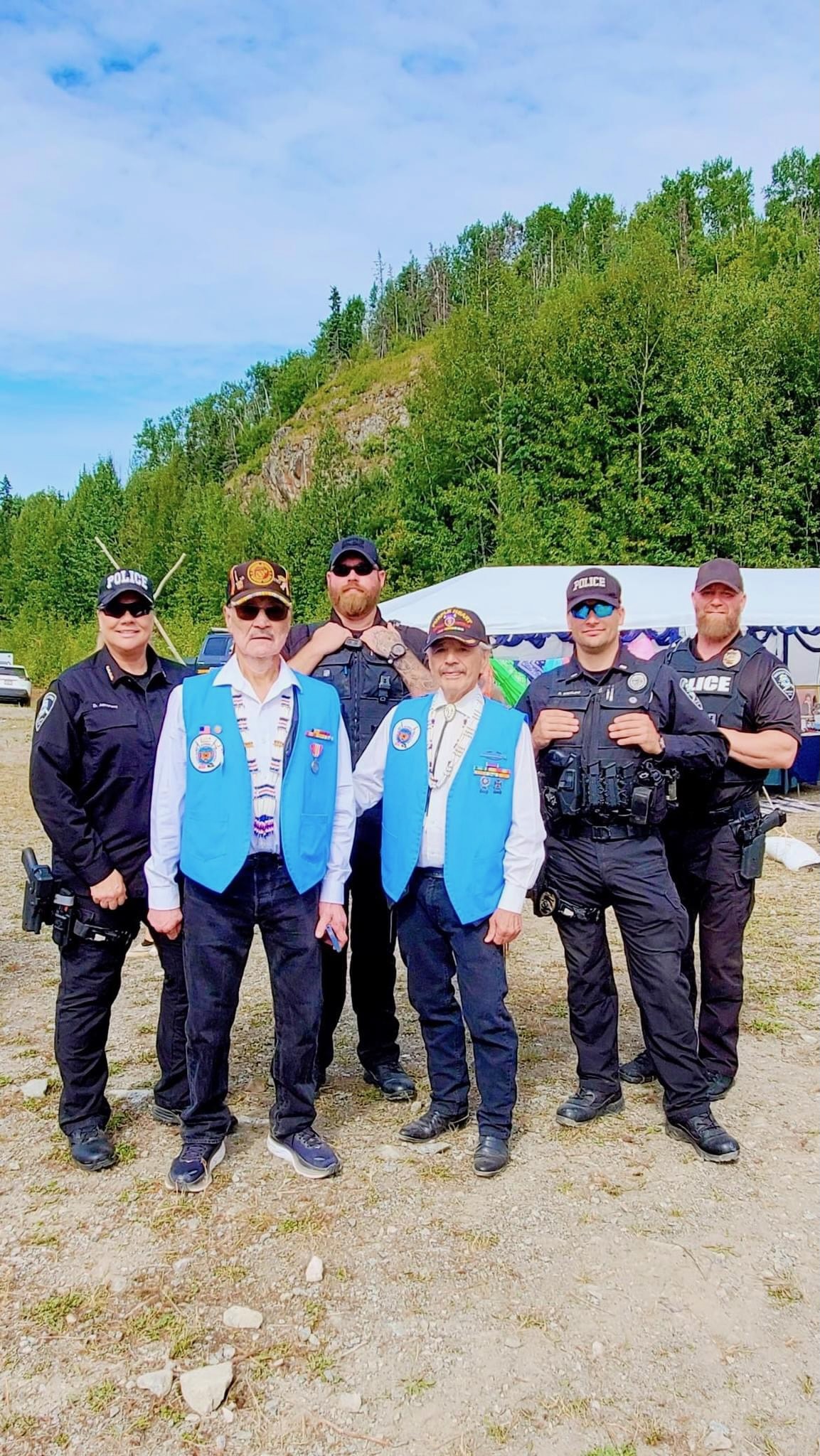Breaking New Ground: Alaska’s First Tribal Criminal Law Makes History

Eklutna Veteran Elders standing alongside Chickaloon Village Tribal Police Officers at the 2024 Eklutna Powwow. Photo courtesy of Philip Ling, Chickaloon Tribal Court Director
The Chickaloon Native Village Passes the First Tribal Criminal Law in Alaska
In a landmark development for Indigenous justice in Alaska, the Chickaloon Native Eklutna Veteran Elders standing alongside Chickaloon Village Tribal Police Officers at the 2024 Eklutna Powwow. Photo courtesy of Philip Ling, Chickaloon Tribal Court Director Chickaloon Tribal Court Director. “What makes this Village (Chickaloon) recently passed Alaska’s first comprehensive Tribal criminal law, marking a historic shift in how Alaska Native Tribal governments can address crime and maintain public safety within their Village. This groundbreaking achievement provides Chickaloon with the framework and authority to enforce its own criminal laws for the first time, setting a precedent that could transform Tribal justice across our state. As this new system takes shape, Alaska’s 228 other federally recognized Tribes are watching closely, recognizing the potential to reclaim a fundamental aspect of Tribal sovereignty.
“Our ancestors have always known how to keep peace in our communities,” says Philip Ling, so important is that for the first time, our Tribe can officially handle criminal cases in ways that match our cultural values.”
The 2022 reauthorization of the Violence Against Women Act (VAWA) created the pathway for Chickaloon and its passage of the first Tribal criminal law in Alaska possible. VAWA 2022 reaffirmed the inherent authority of Alaska Tribes to criminally charge, prosecute, and adjudicate criminal cases involving Native people in their village through their own Tribal criminal courts.
Tami Truett Jerue, Executive Director of the Alaska Native Women’s Resource Center (AKNWRC), explains why this matters. “For years, our Tribes didn’t have the legal clarification and reaffirmation provided in VAWA 2022 regarding our ability to address crime and public safety within our communities. Now, we can handle criminal issues in our own forums, using both our traditional values and modern legal tools to keep our people safe.”
What makes Chickaloon’s approach particularly innovative is its integration of traditional knowledge with modern legal frameworks. The new law implements culturally appropriate justice measures while establishing robust community safety and accountability systems. This isn’t just about punishment—it’s about healing, restoration, and preserving cultural values that sustained Alaska Native communities for countless generations.
The success of this initiative also highlights the power of collaboration. The partnership between Chickaloon, the Alaska Native Women’s Resource Center, the University of Alaska Fairbanks, and Judge David Avraham Voluck demonstrates how different organizations can collectively advance Tribal sovereignty while creating practical, workable solutions to long-standing challenges.
This moment arrives at a critical time for Alaska Native Tribal governments. As they face evolving challenges in maintaining peace and security in their villages, the ability to implement culturally appropriate justice systems becomes increasingly vital. Chickaloon’s achievement shows that it’s possible to create effective, culturally grounded criminal justice systems while exercising inherent sovereign rights.
For Alaska’s other 228 federally recognized Tribes, Chickaloon’s achievement offers both inspiration and a practical roadmap. The law provides a template for how Tribes can exercise criminal jurisdiction while respecting both traditional and contemporary legal frameworks. It shows how communities can develop justice systems that strengthen safety while honoring cultural values and promoting healing for all involved.
Looking ahead, the implications are profound. For Tribal governments considering similar initiatives, the path forward requires careful consideration and consultation with community members and leadership, documentation, incorporation of traditional and modern justice practices, and capacity development for law enforcement and judicial proceedings. State and federal partners, too, have important roles to play in supporting cross-jurisdictional cooperation and working to ensure smooth cooperation between Tribal courts and other law enforcement agencies. Most importantly, our state and federal partners must respect Tribes’ right to handle their affairs while helping facilitate information sharing between communities.
The path forward requires a sustained commitment from all stakeholders—Tribal governments, state and federal partners, and supporting organizations. But as Alaska moves into this new era of Tribal criminal justice, the experience of Chickaloon Native Village offers both practical guidance and inspiration. It suggests that the future of criminal justice for Alaska Native communities will be increasingly shaped by Tribal governments exercising their sovereign authority to protect their citizens through systems that honor traditional wisdom and contemporary legal requirements.
For the Chickaloon Native Village, this new law represents a return to traditional ways of maintaining justice and a bold step into the future. As other Tribes across Alaska watch and learn from their experience, the potential for a transformation in how justice is served in our Alaska Native communities grows stronger. This isn’t just about creating new laws—it’s about reinvigorating traditional wisdom and applying it to contemporary challenges in ways that strengthen communities and honor Tribal sovereignty.





